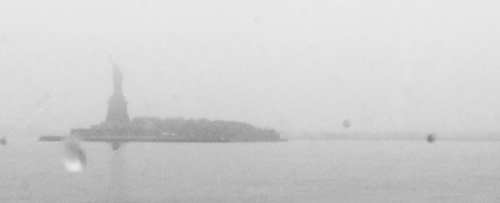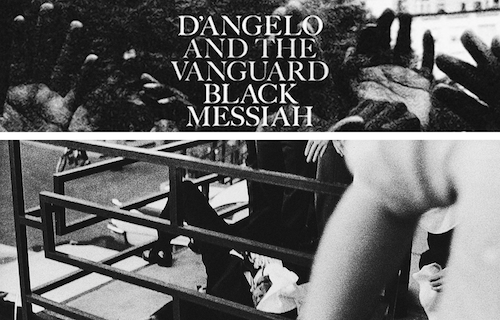Essays Shaun Scott — January 19, 2015 9:59 — 1 Comment
What We Were Never Taught – Shaun Scott
If you’re coming from lower Manhattan like I was, there’s no way to the Staten Island storefront that spawned #icantbreathe without taking a ferry.Â
On a sunny day, the views of the Freedom Tower and the Statue of Liberty are second to none. But I was on vacation from Seattle in the dead of winter, and felt right at home as a winter mist blanketed the skyscrapers. This was precisely the kind of weather I thought I’d left behind in the Pacific Northwest—but no matter where you are, there you are: after traveling 3000 miles across the country, I was still a black writer whose appreciation of epic Americana was impeded by a white fog.
In a city full of tourist destinations, the spot where New York’s police force decided to not let Eric Garner be alive anymore is the unlikeliest. It’s a short 10 minute walk from where the Staten Island ferry lets you off—maybe even shorter if you walked at my pace, dodging raindrops on the way to the nondescript strip at 202 E. Bay Street. I arrived at the vigil to Garner soaked, and short of breath.
A murder of black and disabled men congregated nearby like crows around crumbs. A neighborhood griot held court with a heavy rap about “the earth’s original man.†And oblivious to the pictures I snapped conspicuously, laborers in this black hole of capitalism executed what 30 years of experience living in major cities tells me could’ve been hand-to-hand drug sales. A man who fit any number of racial phenotypes approached in a hurry, only to stop and occupy the exact same spot on the block that Eric Garner did when he died.
Did this guy not understand from CNN that “everything is different now�
A bleak reality spoke calmly in stark terms, its somber message amplified by a steady drizzle: an epicenter of a national conversation about race and the arbitrary dispensation of police power is also the site of cyclical malaise. Water and wind impose themselves uncaringly there, but few scurry for shelter. What did I expect to find? My chin and shoulders slumped after a few minutes at the unfortunate landmark. I took a few pulls on a cheap cigar, struggling to keep it from being extinguished by the rain. And I left feeling fortunate I had someplace better to be.
One of them was inside a warm movie theatre, watching filmmaker Ava DuVernay’s achievement Selma, a biopic about slain Nobel Peace Prize winner Martin Luther King’s effort to see comprehensive civil rights legislation passed in 1965. Back at the family house in Queens, I was surprised to see my mother already had the movie on DVD, thanks to the citywide bootleg market that some of the wanderers on 202 E. Bay Street were engaged in. Holding steadfast to my plans to see it in a black theatre, I told my sister that—coming all the way from Seattle—I was “really looking forward to using this trip to vibe with The Black Experience in ways that aren’t always accessible in the northwest.†Her reply, spat casually after she steals a swig from my Heineken:
“Well… if watching a bootleg of a Martin Luther King biopic in your mom’s basement while eating this sweet potato pie isn’t black enough for you, I guess we can go to Harlem and see it. On a Tuesday?â€
There are certain pitfalls in choosing to reanimate a narrative we’re legally obligated to observe every January. DuVernay imagines Dr. King as locked in a conflict we already know he wins. This kind of moral clarity makes for a great “message filmâ€, but it’s a message that easily becomes white noise. However much credit Selma deserves for producing a candid and photogenic reissue with top-shelf production values, I don’t think America will experience a breakthrough in how it perceives King (or itself) until it shifts its gaze to his life after 1965.
After the passage of the Civil Rights Act in that year, King was at something of a political loss: when a man’s life is consumed by one goal, what does he do when he finally achieves it? Organize against the Vietnam War? Engage in non-violent direct action with labor unions? Sever ties with moderates who couldn’t be trusted? Join forces with militants like the Black Panthers? All of the above? Selma artfully suggests some of the indecisiveness that took hold of Martin in his last years, but the familiar narrative framing essentially ends his life with the passage of the Civil Rights Act.
As some of us are aware, racism didn’t die in 1965. And neither did Martin. But what did Dr. King say when his message became bigger than denouncing southern bigotry? Is it a coincidence that his life ended a week after organizing a massively disruptive strike with sanitation workers?—And that an FBI memo identified King as a “black messiah†that a country bent on showing the world surface-level stability during the Cold War had to neutralize?
Selma fills in much more of the picture than your average biopic. But we can’t remember what we were never taught—and the average MLK Day celebration doubles down on what we already know. Why?
The point has been made by filmmaker and Marxist cultural critic Charles Mudede that the #icantbreathe meme is an example of a “new spirit of capitalismâ€, where only politically impotent movements can break into the sentimental American mainstream. For Mudede, the widespread sloganization of a murdered man’s famous last words endorses black passivity, and the fact the phrase showed up in Comic Sans on a t-shirt worn by LeBron James was already proof that protestors had given away their power.
I’m not sure I’d go as far as Mudede: during the 60s, incremental progress was heralded when Charlton Heston and Marlon Brando made media appearances at the March on Washington, showing that symbolic victories on the level of representation are often harbingers of concrete political change. But when you look at the film through this lens, maybe we should be glad Ava DuVernay didn’t win an Oscar nomination. As long as African-Americans suffer second-class citizenship, maybe the contradiction between black excellence and racist institutions that can’t understand it should remain explicit. After all: Malcolm X chided Dr. King for receiving a Nobel Peace Prize at a time when black America was under siege. What’s it look like when the country you’re fighting a war against gives your general a prize?
Riding the A train back from the Magic Johnson-owned theatre in Harlem where I watched Selma, D’Angelo’s “1000 Deaths†pulsated through my headphones. I still couldn’t stop thinking about how underwhelmed I was by 202 E. Bay Street. How I expected to find something that “validated†the anger I feel over Eric Garner’s passing, as if it wasn’t bad enough by itself. How I hoped it would be a kind of activist’s Garden of Eden. But the reality there was hostile to this sort of sentimentality. DuVernay’s Selma is a picturesque moral landscape where activists wear quaint vintage clothes, everyone has a charming southern accent, and its clear who the bad guys are. With its non-violent tactics designed to morally shame its opponents by putting a global spotlight on racism, Selma was nothing if self-conscious—meanwhile, Garner’s Staten Island couldn’t care less whether anyone watched. And yet we know that the two places are related.
My plan when I came to New York was to participate in a #BlackBrunchNYC demonstration, and then stay at that same restaurant for actual brunch. I had it all mapped out: dressed in menacing black hoodies, a dozen of us would descend on an upscale diner on the Upper West Side. We’d barge in on shocked moneyed brunchers with an aggressive recitation of the names of black men, women and children murdered in the last year by killers who never had to face trial. I’d raise a clenched fist in defiant protest of the criminalization of black life—then have a seat and order “the eggs benedict and a Bloody Mary, thanks.â€
I never got the invite. But you get the point: maybe we’re a long way from a segregated lunch counter in Selma. I know this may come as an utter shock to you, but I’m no Dr. King—and chances are, you aren’t either. At a time of turmoil, he was, on the surface, as restrained and respectable a public figure as you could ask of anybody not named Barack Obama. Did you know that he was a smoker who was wary of being photographed in the act because of the social stigma surrounding cigarettes? In the end, he was a black man under a ton of pressure who got shot in the face while stepping out on the balcony to unwind with a quick smoke after work.
We see where the politics of respectability got our grandparents—and where they didn’t get our parents. And many of us are deciding it isn’t worth it to be suffocated by rules we don’t enjoy playing by. Selma producer and actress Oprah Winfrey’s statements about the supposed aimlessness of organizers in Ferguson and New York City? Somebody welcome her to the 21st century, where vacation-activism is a thing, and hundreds of people a week send Dick Cheney glitter bombs in the mail because they oppose torture. Past a certain point, the old tactics didn’t work—we’ve got the death certificates to prove it.
All our kings are dead; so make way for the unruly subjects.
One Comment
Leave a Reply
The answer isn't poetry, but rather language
- Richard Kenney









God this is good. Bravo Shaun Scott!